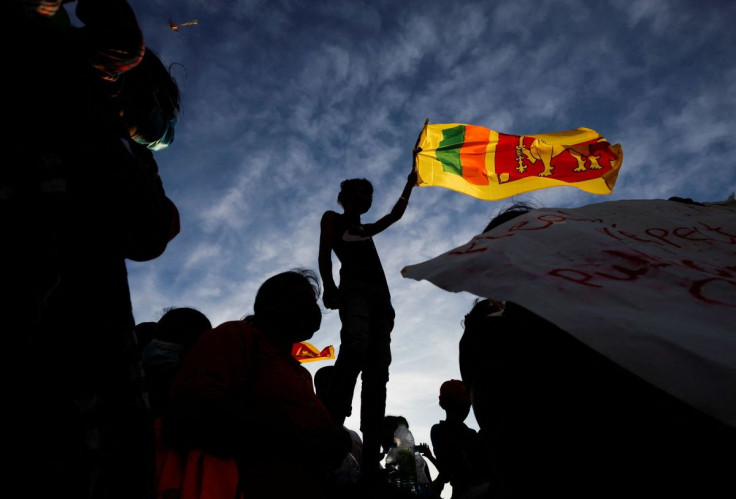In Sri Lanka’s May Mayhem Confusion Reigns Supreme

Currently, all political parties in crisis-ridden Sri Lanka are sulking to shoulder the burden of putting things in order and heed the request of the executive presidency. Their reluctance has given enough room for the army to act on its own as the country is already placed under emergency after the calls for the scalp of the President grew louder along with the calls to form an all-party government.
Samagi Jana Balawegaya (SJB) leader Sajith Premadasa has succinctly made it clear that he does not want to be the Prime Minister of the country, which owes a total foreign debt of $35 billion, with $7 billion due this year alone.
It is the first time since its independence from Britain in 1948, that the Island nation defaulted $51 billion on its foreign debt last week.
Anura Kumara Dissanayake, leader of the Left-leaning Janatha Vimukthi Peramuna (JVP), has categorically stated that he does not want to be a part of an administration led by Gotabaya Rajapaksa, the Indian Ocean nation's president. The executive president and younger brother of disgraced prime minister Mahindra Rajapaksa has not been seen in public after thousands stormed his private residence in Colombo March 31. Although he continued to issue official statements.
The idea of a caretaker unity government, mooted by the president after Mahindra and his cabinet resigned on May 9, has not found favour with former Prime Minister Ranil Wickremesinghe, too.
All senior opposition leaders share similar concerns that a national government may not be able to manage Sri Lanka's worst-ever economic crisis, which has made essential items like fuel, cooking gas and medicines dearer and lengthy power blackouts the order of the day in the 22 million import-reliant nation.
Without exception, all opposition parties' top honchos feel that a reluctant unity government is doomed to fail and will eventually turn Lanka into a failed state.
The forex-crisis-hit country is losing millions per day due to political instability. But the country desperately needs a new government with a fresh mandate to raise funds internationally. Apparently, the strategic nation will have to struggle to mobilize money to hold free and fair snap polls at the same time.
Though for the past four weeks the country's parliament has been holding discussions on who will run the country and take the key posts, the talks have remained inconclusive so far.
Premadasa has reportedly listed a series of conditions like clipping the wings of President Gotabaya Rajapaksa and transferring some of the presidential powers to parliament. He wants to implement the Bar Association's proposal to abolish the executive presidency in the crisis-wracked country.
Premadasa's party holds 54 seats in the 225-seat house. Already, nearly 42 ruling party MPs have formed an independent bloc. However, it has not joined hands with the opposition so far.
Following clashes with government supporters, angry mobs burned down May 9 several homes belonging to the ruling party. They also attempted to storm the prime minister's official residence while he was holed up inside.
The ancestral home of the Rajapaksa clan that has been turned into a controversial museum in the southern district of Hambantota was also set on fire. Houses of various ministers and MPs were also targeted. Mahinda and his key family members have been moved to the Trincomalee Naval Airbase in the Eastern Province.
The death toll rose to eight on May 10 and more than 220 have been injured in the violence in Colombo and other cities, according to Sri Lankan police.
Amarakeerthi Athukorala, a ruling Sri Lanka Podujana Peramuna (SLPP) party lawmaker, died after a standoff with anti-government protesters in Nittambuwa near the capital Colombo, police said. According to local media, Athukorala was shot dead by a 27-year-old man who then took his own life.
The curfew is imposed across the country until further notice and military contingents are deployed to assist law enforcement. The government has placed the country under emergency since May 6.
In a situation where there is both a state of emergency and curfew, the country's defence ministry ordered May 10 troops to shoot on sight people involved in ransacking public property, AFP reported.
"Security forces have been ordered to shoot on sight anyone looting public property or causing harm to life," the defence ministry said May 10.
Under the latest decision, the military can detain people for up to 24 hours before handing them to the police and can conduct raids on any private property.
Earlier in 2009, the army had lent crucial logistics support to Gotabaya Rajapaksa, Sri Lanka's defence secretary then, to put a brutal end to a decades-long civil war with the separatist Tamil Tigers. The UN said that more than 40,000 Tamil civilians perished in the ethnic cleansing.
The country's worst-ever economic crisis will be a turning point after decades of ethnic and religious violence. But the outcome is unpredictable now.
























